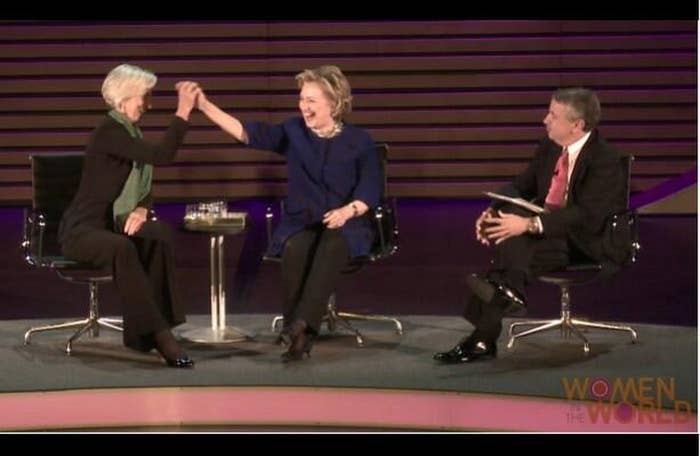
It was half serious, half in jest. But when the moderator Thursday night told Hillary Clinton and Christine Lagarde they might one day make a great team — one as United States president, the other as European Commission head — the audience of hundreds at Lincoln Center roared. Clinton raised an open palm in the air for a high-five, and when she and Lagarde clasped hands, smiling, the din grew louder.
The former secretary of state, usually more circumspect with references to her future, appeared relaxed alongside Lagarde, the managing director of the International Monetary Fund. The event, moderated by columnist Thomas Friedman, opened the annual "Women in the World" summit.
Clinton headlined the same conference last year. She spoke on the same stage, in front of the same audience of fans, with the same handful of "Ready for Hillary" volunteers scattered about outside the David H. Koch Theater. Tina Brown, the host of the summit, made the same jokes about the next presidential race in the same introductory speech. And Clinton made the same points about her lifelong mission to empower women and girls, and about the work still left to do.
One year later, though, Clinton also appeared more at ease as she high-fived Lagarde and searched for the faces of friends in the front row, her hand shielding her eyes from the bright lights. Perhaps it was the format of this year's event — she made no prepared remarks. Or perhaps it was Lagarde, a woman with whom she's shared the stage before. But on Thursday night, Clinton offered a smattering of relatively revealing comments on topics including her State Department record, her view of media bias, and her effort to take criticism "seriously," not "personally."
When Friedman asked Clinton about her four years as secretary of state — asking what she was most proud of, and what she felt she'd left "unfinished" — she turned to a new metaphor to describe her tenure. "I really see my role as secretary, and in fact leadership in general in a democracy, as a relay race," Clinton said. "You run the best race you can run. You hand off the baton."
Clinton's answer gestures toward what has become the knock from critics on her record at Foggy Bottom: that she traveled nearly a million miles to a total of 112 countries — statistics her office once brandished frequently — but that she managed few concrete accomplishments. "We needed to make it clear to the rest of the world that we were going to get our house in order," Clinton said. "I'm very proud of the stabilization and really solid leadership that the administration provided that I think now leads us to be able to deal with problems like Ukraine."
"And then of course there a lot of particulars," Clinton said. "But I am finishing my book so you'll be able to read all about it."
Clinton, now in the throes of putting together her second memoir, is expected to use the book as an opportunity to define and outline her record as secretary.
Friedman also asked Clinton and Lagarde whether they believe women in power are still portrayed unfairly in the media. Both said yes.
A journalist, Lagarde told the audience, once wrote a "full-page" story about her hairstyle, which happened to be a bit longer than usual at an IMF meeting last year. Clinton, offered her own story: When she lived in Arkansas, where she worked as a young lawyer, she picked up the local paper and turned to an advice column. Someone, identified only by two initials, sought counsel on the best way to decorate their office.
"So the answer was, 'I can't tell from your initials whether you're male or female. But if you're male, I recommend that if you have a family, you put the pictures in your office because then everyone will know you're a responsible, reliable family man. If you are a female, don't have any pictures of your family, because then they think you won't be able to concentrate on your work,'" Clinton recalled.
"This was so long ago, and yet some of those attitudes we know persist," she said.
The conversation then turned to a question Clinton answers frequently: "What is your best advice to young women who want to rise up in this world?"
Clinton quoted the same line she often does — Eleanor Roosevelt's cautionary phrase: "grow skin like a rhinoceros" — but also outlined what seemed to be her own philosophy in navigating public life: Play the "outside and inside game."
"On the outside, you have to find ways to raise these issues that are truly rooted in sexism or old-fashioned, irrelevant expectations about women's lives," Clinton said. "Not just to score a point, but to change a mind."
"I've often been the only woman in the room," she said, recalling times when a man's eyes would "glaze over" as the conversation turned to women's issues. "You have to think of some way to bring it back. Like, 'Oh, I know you have a daughter. You must be so proud of her. What do you want her to do?'"
As for the "inside game," Clinton urged young women to be "resilient," to keep moving forward. "They too often take criticism personally instead of seriously. If you take criticism seriously, you might learn something, but you can't let it crush you."
"That takes a sense of humor about yourself and others. And believe me, this is hard-won advice," said Clinton, referencing her own decades-long role as one of the most scrutinized women in the country. "It's a process."
